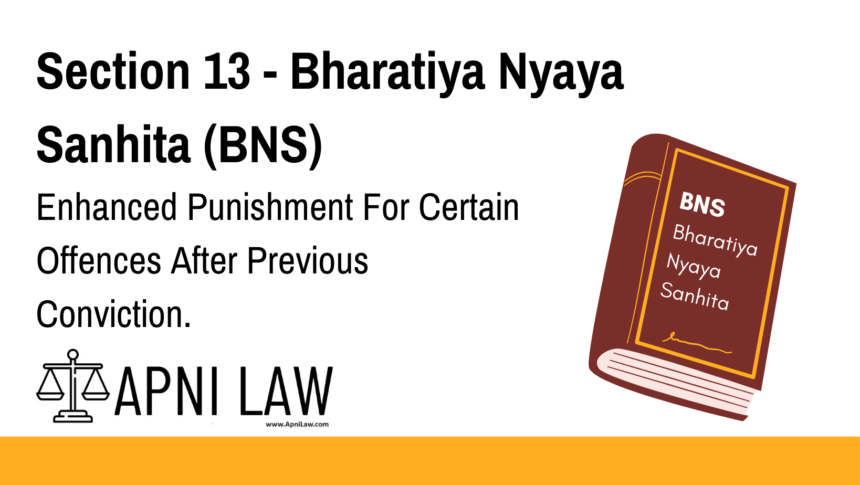Code: Section 13 BNS
Section 13
Whoever, having been convicted by a Court in India of an offence punishable under Chapter X or Chapter XVII of this Sanhita with imprisonment of either description for a term of three years or upwards, shall be guilty of any offence punishable under either of those Chapters with like imprisonment for the like term, shall be subject for every such subsequent offence to imprisonment for life, or to imprisonment of either description for a term which may extend to ten years.
Explanation of Section 13 BNS
Section 13 of the Bharatiya Nyaya Sanhita (BNS), 2023, prescribes enhanced punishment for repeat offenders convicted under Chapter X (Offences Relating to Public Servants) or Chapter XVII (Offences Against Property). This provision is aimed at deterring habitual offenders by imposing stricter penalties on those who commit repeated offenses under these Chapters.
Key Provisions
- Applicability
- The section applies to individuals who have been previously convicted of a serious offense (punishable by three years or more in prison) under Chapter X or Chapter XVII.
- Enhanced Punishment for Repeat Offenders
- If a person commits another offense under either of these chapters after a previous conviction, they may face:
- Life imprisonment, or
- Imprisonment up to ten years.
- If a person commits another offense under either of these chapters after a previous conviction, they may face:
- Objective of the Law
- The purpose of this provision is to deter habitual criminals and repeat offenders from engaging in repeated unlawful activities.
Illustration
Example 1: Repeat Theft Case
A person was previously convicted under Section 303 BNS (Theft) and sentenced to four years of imprisonment. After release, they again commit a similar theft offense under Section 304 BNS. Since this is a second offense under Chapter XVII, they may now be sentenced to life imprisonment or up to ten years in jail under Section 13 BNS.
Example 2: Corruption by a Public Servant
A government officer was convicted under Section 165 BNS for bribery and sentenced to four years of imprisonment. If the officer commits a similar offense again under Section 166 BNS, they will face harsher penalties under Section 13.
Common Questions & Answers on Section 13 BNS
1. Who does Section 13 BNS apply to?
Section 13 applies to individuals who have previously been convicted of an offense under Chapter X or Chapter XVII and commit another offense under the same chapters.
2. What is the maximum punishment under Section 13 BNS?
The maximum punishment for repeat offenders is life imprisonment or up to ten years of imprisonment.
3. Why does Section 13 impose stricter penalties for repeat offenses?
The provision is designed to prevent habitual offenders from continuously engaging in criminal activities by enforcing harsher punishments.
4. Does this section apply to all criminal offenses?
No, it specifically applies to offenses under Chapter X (Public Servants) and Chapter XVII (Property Offenses).
5. Can a person appeal against enhanced punishment under Section 13?
Yes, a person can file an appeal in the higher court if they believe the enhanced punishment was wrongly imposed.
Conclusion
Section 13 of the BNS, 2023, plays a crucial role in curbing repeat offenses by imposing stricter penalties on habitual criminals. By ensuring tougher punishment for second-time offenders, this provision strengthens the criminal justice system’s deterrence mechanism.
For more legal insights, visit ApniLaw today! 🚀








